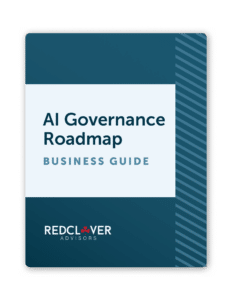In recent years, developments in AI, such as large language models and generative AI, have changed the game.
If we use “changed the game” as the idiom, it’s like the US hockey team defeating the Soviet Union in 1980, which didn’t just win them a gold medal but reshaped how the world viewed American hockey. Or Usain Bolt’s world-record-breaking 100- and 200-meter sprints at the 2008 Beijing Olympics, which redefined the limits of human speed.
These moments didn’t just break records—they shifted audience expectations, training strategies, and the future of competition. Similarly, AI is transforming business operations, from automating workflows to driving predictive insights and reshaping customer experiences.
But with AI’s potential comes complexity, especially when it comes to evaluating tools for privacy, security, and long-term viability. That’s why it’s crucial to ask the right questions before adopting an AI tool for your business.
Key questions to ask vendors about privacy and security practices
As you consider if an AI tool is right for your short- and long-term goals, you should be asking a lot of questions—what data goes into the tool, how it’s used, and, importantly, how the vendor protects that data.
Whether you’re building an AI governance program or evaluating a single tool, vendor assessment should be front and center.
So, what should you be asking?
Data collection and usage
AI can seemingly work magic (though, of course, it’s not magic—it’s an algorithm) based on the information you feed into the system. But understanding how the tool interacts with your data is essential. You need to know what the system collects, how it stores that information, and whether the vendor uses it beyond your intended purpose.
Start with these questions:
- Does the vendor clearly outline data use practices in their privacy notice and AI policy?
- How does the AI tool collect, process, and store personal data?
- Is data collection limited to what’s necessary for the intended purpose, or does it gather additional information?
- Does the vendor use customer data to train its AI models? If so, how is that data anonymized and protected?
- Can you control what data the tool accesses based on your company’s privacy policies?
- If the tool ingests sensitive data, does the vendor provide documentation confirming that data is excluded from model training?
These questions clarify whether the tool—and the vendor behind it—align with your internal privacy standards and regulatory obligations.
Privacy and security measures
If you have security measures in place to protect your data, but your vendors don’t, then you’re putting your data at risk. Ask your AI vendor:
- What encryption protocols protect data both in transit and at rest?
- How does the vendor prevent unauthorized access to company or customer data?
- If a data breach occurs, what’s the vendor’s incident response plan?
- Does the vendor hold industry-recognized security certifications, such as ISO 27001, SOC 2, or FedRAMP?
- Can the vendor provide documentation demonstrating regular security audits and privacy reviews?
More than half of all data breaches are attributed to third parties. These questions will help protect your company from becoming part of that statistic.
Transparency and explainability
Many AI systems suffer from a “black box” issue—you get an answer but no explanation of how the tool got there. This is problematic when AI informs decisions about hiring, lending, or other sensitive matters; unexplained outcomes can lead to compliance issues or even legal liability.
To avoid putting your company at risk, ask:
- How transparent is the AI tool’s decision-making process?
- Can the vendor provide documentation explaining how the system arrives at its outputs?
- Is there an option to audit the AI’s processes and identify potential biases?
Check in with them on their general privacy best practices, too:
- Does the vendor have a Trust Center that provides documentation on privacy, security, and AI practices?
- Is the vendor’s privacy notice and AI policy easily accessible and clearly written?
If the vendor can’t demonstrate how their AI arrives at decisions, how errors are addressed, or even their general privacy practices, it’s a sign that the tool might not be ready for business use—or at least for your business use.
Compliance with regulations
No one likes to be in trouble with your state attorney general.
AI-specific regulations are rapidly expanding, from the EU AI Act to the Utah AI Policy Act. Even if your business isn’t directly subject to these laws, you don’t want to be caught off guard if they become industry standards.
Check in with vendors about their compliance practices:
- How does the AI tool align with relevant privacy regulations like GDPR, CCPA, and other state laws?
- Are there features to support data subject rights (access, deletion, portability)?
- If data crosses borders, how does the vendor ensure it meets international transfer requirements?
- Does the vendor provide compliance documentation, including DPIAs (Data Protection Impact Assessments) and privacy impact reviews?
A good vendor will have clear answers—and documentation to back them up.
Integration and scalability
Even if an AI tool checks all the privacy and security boxes, it’s only useful if it fits seamlessly into your existing infrastructure—including your privacy workflows. Poor integration can lead to messy workarounds, increased risk, and frustrated teams.
To avoid surprises, ask:
- Will the AI tool integrate with your current systems and privacy protocol or will you need custom development to make it work?
- Are you able to set user permissions, data retention timelines, and access controls to match your privacy policies?
- Will it maintain performance and privacy protections if your operations expand or your data needs change?
If the vendor can’t demonstrate how the tool fits into your environment—or if customization is complicated or costly—that tool could become more of a burden than a benefit.
Employee training and awareness
Even the most secure AI tool can’t protect your data from human error. If employees don’t know how to use the system responsibly, your privacy program has a glaring gap. That’s why training isn’t optional—it’s essential.
Ask the vendor:
- Will the vendor provide onboarding resources, user guides, or hands-on workshops?
- As AI features evolve, will your team stay informed about new risks and controls?
Depending on the tool, you might need to integrate role-based privacy training into your existing employee education programs. For example, marketing teams using AI for personalization should understand data minimization principles, while HR teams need training on how AI handles sensitive employee information.
If the vendor’s answer to training is “you’ll figure it out,” that’s a sign you’ll be stuck filling the gaps—and carrying the risk.
Stay ahead of the game—with confidence and compliance
Your job doesn’t have to include navigating the changing rules of the AI game. Red Clover Advisors helps businesses keep the ball moving with:
To get started, check out Red Clover Advisor’s AI Governance Roadmap business guide. When you’re ready, schedule a consultation to see how you can build an AI roadmap that works for your business and protects your business.
AI Governance Roadmap: Business Guide
Our AI Governance Roadmap guides you to success in developing an AI governance program.



